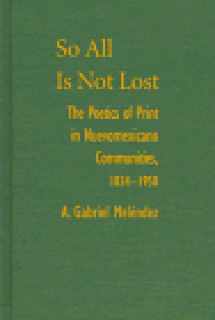
So All Is Not Lost: The Poetics of Print in Nuevomxicano Communities, 1834-1958 (Paso Por Aqui Series on the Nuevomexicano Literary Heritage)
ISBN-13:
9780826317766
ISBN-10:
0826317766
Edition:
First Edition
Author:
A. Gabriel Meléndez
Publication date:
1997
Publisher:
Univ of New Mexico Pr
Format:
Hardcover
268 pages
FREE US shipping
on ALL non-marketplace orders
Marketplace
from $36.60
USD
Marketplace offers
Seller
Condition
Note
Seller
Condition
New
New - excellent clean condition, hard-bound, "So All Is Not Los", Author: Melendez, A. Gabriel*** Publisher: University of New Mexico Press, 1997
Book details
ISBN-13:
9780826317766
ISBN-10:
0826317766
Edition:
First Edition
Author:
A. Gabriel Meléndez
Publication date:
1997
Publisher:
Univ of New Mexico Pr
Format:
Hardcover
268 pages
Summary
So All Is Not Lost: The Poetics of Print in Nuevomxicano Communities, 1834-1958 (Paso Por Aqui Series on the Nuevomexicano Literary Heritage) (ISBN-13: 9780826317766 and ISBN-10: 0826317766), written by authors
A. Gabriel Meléndez, was published by Univ of New Mexico Pr in 1997.
With an overall rating of 4.1 stars, it's a notable title among other
books. You can easily purchase or rent So All Is Not Lost: The Poetics of Print in Nuevomxicano Communities, 1834-1958 (Paso Por Aqui Series on the Nuevomexicano Literary Heritage) (Hardcover) from BooksRun,
along with many other new and used
books
and textbooks.
And, if you're looking to sell your copy, our current buyback offer is $0.07.
Description
Based on exhaustive archival research, this study spans the history of newspapers in the Southwest's Mexicano communities from the arrival of the press in New Mexico to the last edition of Santa Fe's El Nuevo Mexicano.Part I details the education and formation of a generation of Spanish-language journalists instrumental in creating a culture of print in nativo communities. Part II offers in-depth analyses of the texts produced by los periodiqueros, establishing them thematically as precursors to the Chicano literary and political movements of the 1960s and 1970s.Moving beyond reinscribing Nuevomexicanos into history, Melendez's insights on print discourse, orality, and literacy provide a new theoretical framework. He sees newspapers as cultural production and the work of the editors as an organized movement against cultural erasure and toward adaptation amid the massive influx of easterners to the new Southwest.


We would LOVE it if you could help us and other readers by reviewing the book
Book review

Congratulations! We have received your book review.
{user}
{createdAt}
by {truncated_author}


